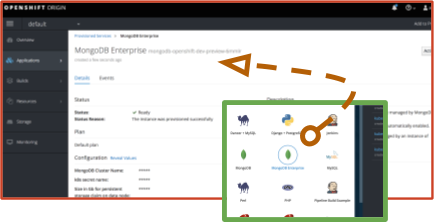In order to compete and get products to market rapidly, enterprises today leverage cloud-ready and cloud-enabled technologies. Platforms as a Service (or PaaS) provide out-of-the-box capabilities which enable application developers to focus on their business logic and users instead of infrastructure and interoperability. This key ability separates successful projects from those which drown themselves in tangential work which never stops.
In this blog post, we'll cover MongoDB's general PaaS and cloud enablement strategy as well as touch upon some new features of Red Hat’s OpenShift which enable you to run production-ready MongoDB clusters. We're also excited to announce the developer preview of MongoDB Enterprise Server running on OpenShift. This preview allows you to test out how your applications will interact with MongoDB running on OpenShift.
Integration Approach for MongoDB and PaaS
Platforms as a Service are increasingly popular, especially for those of you charged with building "cloud-enabled" or "cloud-ready" applications but required to use private data center deployments today. Integrating a database with a PaaS needs to be done appropriately to ensure that database instances can be deployed, configured, and administered properly.
There are two common components of any production-ready cloud-enabled database deployment:
- A modern, rock-solid database (like MongoDB).
- Tooling to enable telemetry, access and authorization, and backups (not to mention things like proactive alerting that integrates with your chosen issue tracking system, complete REST-based APIs for automation, and a seamless transition to hosted services.) For MongoDB, this is MongoDB Ops Manager.

A deep integration of MongoDB Ops Manager is core to our approach of integrating MongoDB with popular PaaS offerings. The general design approach is to use the "separation of concerns" design principle. The chosen PaaS handles the physical or virtual machines, CPU and RAM allotment, persistent storage requirements, and machine-level access control, while MongoDB Ops Manager controls all aspects of run-time database deployments
This strategy enables system administrators to quickly deploy "MongoDB as a Solution" offerings within their own data centers. In turn, enterprise developers can easily self-service their own database needs.
MongoDB Enterprise Server OpenShift Developer Preview
Our "developer preview" for MongoDB on OpenShift can be found on GitHub. The preview allows provisioning of both MongoDB replica sets and "agent-only" nodes (for easy later use as MongoDB instances) directly through OpenShift. The deployments automatically register themselves with an instance of MongoDB Ops Manager. All of the technical details and notes of getting started can be found right in the repo. Here, we'll just describe some of functionality and technology used.
The preview requires access to an OpenShift cluster running version 3.9 or later and takes advantage of the new Kubernetes Service Catalog features. Specifically, we're using the Ansible Service Broker and built an Ansible Playbook Bundle which installs an icon into your OpenShift console. The preview also contains an example of an OpenShift template which supports replica sets and similar functionality.
A Tour and Deploying Your First Cluster
Once you have your development environment ready (see notes in the developer preview GitHub repository) and have configured an instance of MongoDB Ops Manager, you're ready to starting deploying MongoDB Enterprise Server.

Clusters can be provisioned through the OpenShift web console or via command line. The web console provides an intuitive "wizard-like" interface in which users specify values for various parameters, such as MongoDB version, storage size allocation, and MongoDB Ops Manager Organization/Project to name a few.
Command line installs are also available in which parameter values can be scripted or predefined. This extensibility allows for automation and integration with various Continuous Integration and Continuous Delivery technologies.
A future post will detail cluster configuration and various management scenarios, such as upgrades, performance tuning, and troubleshooting connectivity, so stay tuned.
We're excited to introduce simple and efficient ways to manage your MongoDB deployments with tools such as OpenShift and Kubernetes. Please try out the developer preview and drop us a line on Twitter #mongodb-openshift or email bd@mongodb.com for more information.
Sull'autore
Ricerca per canale
Automazione
Novità sull'automazione IT di tecnologie, team e ambienti
Intelligenza artificiale
Aggiornamenti sulle piattaforme che consentono alle aziende di eseguire carichi di lavoro IA ovunque
Hybrid cloud open source
Scopri come affrontare il futuro in modo più agile grazie al cloud ibrido
Sicurezza
Le ultime novità sulle nostre soluzioni per ridurre i rischi nelle tecnologie e negli ambienti
Edge computing
Aggiornamenti sulle piattaforme che semplificano l'operatività edge
Infrastruttura
Le ultime novità sulla piattaforma Linux aziendale leader a livello mondiale
Applicazioni
Approfondimenti sulle nostre soluzioni alle sfide applicative più difficili
Virtualizzazione
Il futuro della virtualizzazione negli ambienti aziendali per i carichi di lavoro on premise o nel cloud
